Local elections: Can they predict general elections?
- Published
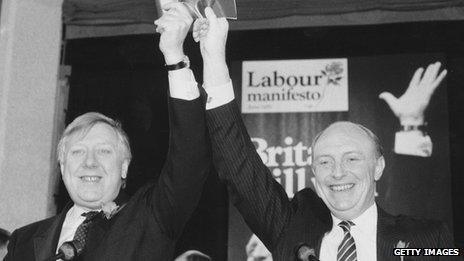
Local elections are a major test of public opinion - but can they tell you who will win the next general election?
According to a BBC analysis of key wards, Labour got the biggest national share of the vote - 29% - in Thursday's local elections.
This is not meant to be a prediction of how people would vote in a general election - simply a projection of what the parties would get if everyone in the country had voted.
But because it is based on actual votes, rather than opinion polling, it is pored over by pundits and party strategists looking for clues as to the real state of the parties.
The projected national share for the Conservatives on Thursday was 25%, UKIP were third with 23% and the Lib Dems fourth on 14%.
Quite how that would translate into seats in Parliament, and what kind of coalition government would eventually emerge, is hard to say.
The surge in support for UKIP has taken Britain into uncharted political waters, according to polling expert Prof John Curtice.
But even without the apparent dawn of four party politics, mid-term elections can give strange readings.
Here is a look at some prescient - and not so prescient - local elections from the past 20 years. All percentages are projected national share of the vote, according to analysis by election experts Colin Rallings and Michael Thrasher.
2012: Labour resurgence
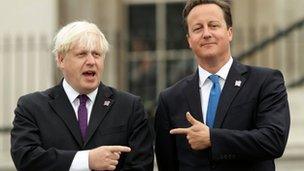
Boris Johnson's re-election distracted from an otherwise difficult night for David Cameron's Conservatives
These elections were held in the aftermath of George Osborne's so-called "omnishambles" budget, and were mostly in the traditionally Labour-held areas of north west England and south Wales.
On the same day as the local elections Boris Johnson was re-elected Mayor of London.
Mr Johnson's victory flew in the face of the national trend, which saw the Conservatives lose 405 councillors, sparking a flurry of speculation about the chances of him becoming the next Conservative leader.
"The mayor of London appealed to so many Londoners, including a substantial proportion of Labour voters, because he let no chance go by over the last four years to defy the Tory leader", wrote Mr Johnson's biographer Andrew Gimson in The Observer, external.
This is one local election prediction that is still pending.
2011: Lib Dem nightmare
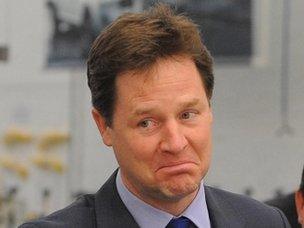
Nick Clegg was branded "a bad PR exercise" by one of his own councillors
These elections mostly covered traditionally Conservative rural seats in England. The Conservatives gained control of four councils, while Labour gained 26.
The big losers were the Liberal Democrats, who lost control of nine of their 19 councils.
The Lib Dems appeared to take the lion's share of the blame for unpopular coalition policies, with voters also punishing leader Nick Clegg for his U-turn on university tuition fees.
Several defeated Lib Dems called on Mr Clegg to resign. Ken Ball, the leader of Chorley council, Lancs, said, external: "Nick Clegg has put us back 40 years. After these elections I hope somebody takes his place. He's been a bad PR exercise."
Mr Clegg said his party needed "to get up, dust ourselves down and move on". His party's poll ratings have yet to show much sign of recovery, external.
2009: Labour meltdown
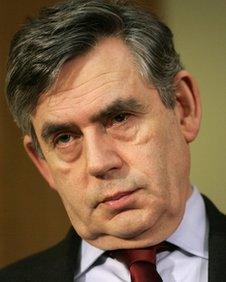
Gordon Brown was accused of having a negative impact on Labours local election result
This was the last time the set of local elections which are being run this year was held.
They took place in the aftermath of the MPs expenses scandal and with Prime Minister Gordon Brown's personal ratings at an all-time low.
The Lib Dems continued their upward trajectory in local elections that had begun in the early 1990s.
As soon as the polls closed, Cabinet Minister James Purnell dramatically resigned, and called on the prime minister to "stand aside to give our party a fighting chance of winning".
The election results were as bad as Mr Purnell and other senior Labour figures had feared. Mr Brown attempted to shore up his position with a reshuffle but went on to lead his party to defeat in the 2010 general election.
2008: Tory landslide
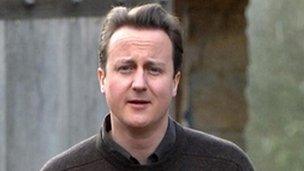
Cameron claimed the result was "a vote of positive confidence in the Conservative Party"
David Cameron's Conservative Party was riding high after seeing off the Gordon Brown honeymoon and threat of a snap election, external in the autumn of the previous year.
Gordon Brown's Labour were widely derided after a series of mishaps including the "election that never was, external", and the loss of the personal details of 25 million child benefit recipients, external.
Ominously for Labour the margin of the defeat was similar to the drubbing received by John Major in council elections in 1995, two years before he was ejected from Downing Street by Tony Blair.
After the Conservatives gained control of 12 councils, David Cameron said: "I think these results are not just a vote against Gordon Brown and his government - I think they are a vote of positive confidence in the Conservative Party."
Two years later he became prime minister, albeit at the head of a coalition government.
2003: Duncan Smith's finest hour
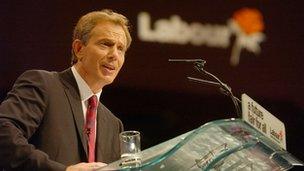
Held two months after the invasion of Iraq, the 2003 local elections were difficult for Labour. They still went on to win the next general election
Two years before the 2005 General Election, and Labour lost control, external of 29 councils, and over 750 council seats.
Iain Duncan Smith's Conservatives scored a more than respectable result, gaining over 560 seats.
He said, external the results were "very heartening", and said the party's sensible policies would help it compete with the "glitz and glamour" of New Labour.
He also hoped that the good local election result would senior colleagues in his own party plotting against his leadership.
It didn't - he was ousted six months later. Labour won the 2005 election.
1999: Hague makes progress
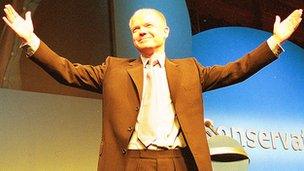
Conservative leader William Hague was unable to make much of an impression at either local or general elections
Two years in to Tony Blair's premiership, and William Hague's Conservatives were struggling to make any headway against New Labour.
These results were better than Hague expected, but they were still the worst mid-term results for any opposition in the twentieth century, external.
Conservative Party Chairman Michael Ancram accentuated the positives, external: "We are winning all over the country and this is what we set out to do."
The Conservatives suffered a landslide defeat in the general election two years later, and Mr Hague became the first Conservative Leader since Austen Chamberlain (who resigned in 1922) not to become prime minister.
1995: Major routed
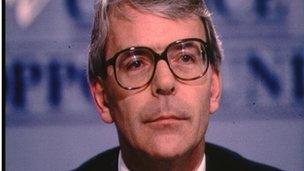
John Major faced a leadership challenge after a bad set of local election results
These were a dreadful set of results for John Major's Conservative Party. They lost some seats which they had held since 1888.
This increased the pressure on Major's already troubled premiership.
Two months later he faced a leadership challenge from then Welsh Secretary John Redwood.
He won that contest, but went on to lose the 1997 general election in a Labour landslide.
Also noticeable was the strong performance of the Lib Dems, who were starting to build a significant power base in local government that would later act as a springboard to success at Westminster.
1990: Kinnock on the way to No 10
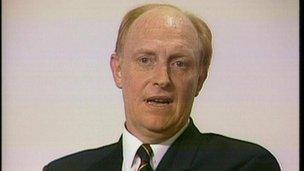
Good mid-term local election results don't necessarily mean you will win a general election
In 1991 Labour leader Neil Kinnock said, external: "In the local elections last year and this year they [the Conservatives] relied on negatives and name calling. They lost.
"They will be relying on negatives and name calling again in the general election and they will lose again."
The Conservatives did not lose the 1992 general election.
In fact, they went on to win it with the largest number of popular votes ever recorded - but with a new leader, John Major.
The 1990 local elections, held in the midst of public anger over the poll tax, undoubtedly played a role in convincing Tory MPs that Margaret Thatcher was becoming an electoral liability.
With hindsight, Mr Kinnock might have preferred a worse night at the polls.
So what have we learned?
Mid-term local elections can set the political weather, giving a boost to party activists or a shot in the arm to a troubled party leader, but they are not always a reliable indicator of what will happen at a general election.
There have been governments which suffered badly in locals and went on to win the next general election, as with Labour in 2003, or the Conservatives in 1990.
On the other hand, sometimes a party does badly at the locals, and does equally badly at the following general election, like the Conservatives in 1995 or Labour in 2009.
Local elections tend to mirror the state of the parties in national opinion polls, which as any party leader knows can change a lot before general election day rolls around.